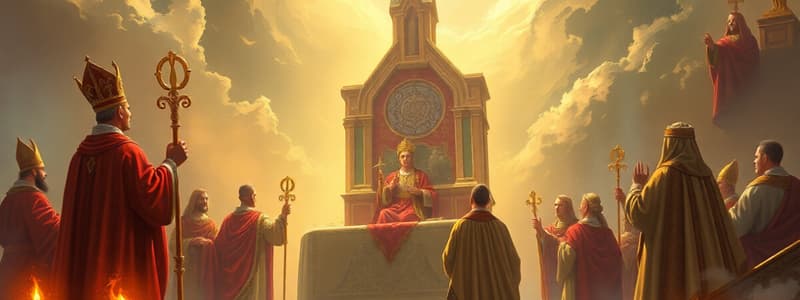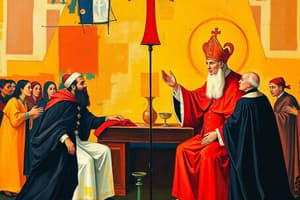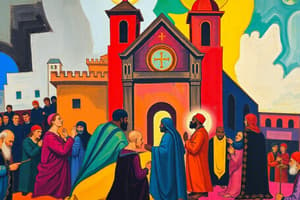Podcast
Questions and Answers
What role does the Pope and priests have in relation to the Gospel?
What role does the Pope and priests have in relation to the Gospel?
They are responsible for preserving the truth of the Gospel and leading the Church.
How did the Council of Trent address issues within the Church?
How did the Council of Trent address issues within the Church?
It was called to correct corruption and improve the training of priests.
What was the Church's intention behind the initial lack of Bible translations?
What was the Church's intention behind the initial lack of Bible translations?
The Church aimed to preserve the true meaning of the texts and avoid misinterpretation.
What impact did the Protestant Reformation have on Christianity?
What impact did the Protestant Reformation have on Christianity?
What is the mission of the Catholic Church?
What is the mission of the Catholic Church?
Why might the Catholic Church's authority be seen as essential in preserving faith?
Why might the Catholic Church's authority be seen as essential in preserving faith?
What were the intentions behind the Spanish Inquisition?
What were the intentions behind the Spanish Inquisition?
How does the Catholic Church view misconduct within its clergy?
How does the Catholic Church view misconduct within its clergy?
What role did Jesus give to Peter in Matthew 16:18-19?
What role did Jesus give to Peter in Matthew 16:18-19?
How is the Pope related to Peter according to Catholic teaching?
How is the Pope related to Peter according to Catholic teaching?
What was the purpose of indulgences in relation to sin?
What was the purpose of indulgences in relation to sin?
What corrective measures did the Catholic Church take to address issues of corruption?
What corrective measures did the Catholic Church take to address issues of corruption?
In what way did the Pope's involvement in politics serve a purpose?
In what way did the Pope's involvement in politics serve a purpose?
What general issue regarding nepotism affected both the Catholic Church and secular systems during the Reformation?
What general issue regarding nepotism affected both the Catholic Church and secular systems during the Reformation?
How does the authority of the Pope reflect divine guidance?
How does the authority of the Pope reflect divine guidance?
Why is claiming that the Catholic Church sold salvation regarded as a misconception?
Why is claiming that the Catholic Church sold salvation regarded as a misconception?
What was the perceived purpose of the Inquisition in maintaining national stability?
What was the perceived purpose of the Inquisition in maintaining national stability?
How did nepotism manifest in the Catholic Church during the Reformation?
How did nepotism manifest in the Catholic Church during the Reformation?
What reforms were implemented by the Church to address corruption?
What reforms were implemented by the Church to address corruption?
What is the Catholic Church's teaching on indulgences and their original purpose?
What is the Catholic Church's teaching on indulgences and their original purpose?
Why is the Eucharist considered central to the Catholic faith?
Why is the Eucharist considered central to the Catholic faith?
What do the doctrines of sola fide and sola scriptura emphasize, and how are they viewed in relation to Catholic teaching?
What do the doctrines of sola fide and sola scriptura emphasize, and how are they viewed in relation to Catholic teaching?
What role did political leaders play during the Reformation?
What role did political leaders play during the Reformation?
What is the Catholic Church’s position on the preservation of Christianity?
What is the Catholic Church’s position on the preservation of Christianity?
Flashcards
Papal Authority
Papal Authority
The authority of the Pope as the leader of the Catholic Church, derived from Jesus' appointment of Peter as the first Pope.
Successor of Peter
Successor of Peter
The Pope is considered the direct successor of Peter, inheriting the role of leader and authority within the Catholic Church.
Nepotism in the Church
Nepotism in the Church
During the Reformation, the practice of appointing family members to positions of power within the Catholic Church.
Indulgences and Salvation
Indulgences and Salvation
Signup and view all the flashcards
Papal Authority and Politics
Papal Authority and Politics
Signup and view all the flashcards
Biblical Basis of Papal Authority
Biblical Basis of Papal Authority
Signup and view all the flashcards
Gates of Hades
Gates of Hades
Signup and view all the flashcards
Council of Trent
Council of Trent
Signup and view all the flashcards
Church's Authority to Reform
Church's Authority to Reform
Signup and view all the flashcards
Church's Mission
Church's Mission
Signup and view all the flashcards
Reason for Late Bible Translations
Reason for Late Bible Translations
Signup and view all the flashcards
Reformation's Impact
Reformation's Impact
Signup and view all the flashcards
Catholic Church's Unity
Catholic Church's Unity
Signup and view all the flashcards
Spanish Inquisition's Purpose
Spanish Inquisition's Purpose
Signup and view all the flashcards
Church's Modern Relevance
Church's Modern Relevance
Signup and view all the flashcards
Spanish Inquisition
Spanish Inquisition
Signup and view all the flashcards
Purpose of Spanish Inquisition
Purpose of Spanish Inquisition
Signup and view all the flashcards
Impact of Nepotism
Impact of Nepotism
Signup and view all the flashcards
Reformation's Impact on unity
Reformation's Impact on unity
Signup and view all the flashcards
Catholic doctrine on Eucharist
Catholic doctrine on Eucharist
Signup and view all the flashcards
Sola Fide and Sola Scriptura
Sola Fide and Sola Scriptura
Signup and view all the flashcards
Political exploitation in the Reformation
Political exploitation in the Reformation
Signup and view all the flashcards
Study Notes
Jesus's Words on the Church
- Jesus established the Church on a foundation of faith, with Peter as its leader (Matthew 16:18-19).
- Jesus gave Peter the keys to the kingdom of Heaven, signifying his spiritual authority to guide and protect the faith.
Papal Authority
- Jesus appointed Peter as the first Pope.
- The Pope's role is based on divinely given authority, not on human power.
- The Pope's role is to preserve truth, guide the Church, and lead.
- Accusations of corruption don't change the Pope's divinely ordained authority.
Indulgences and Salvation
- The Catholic Church never sold salvation.
- Indulgences reduced the consequences of forgiven sins (purgatory).
- Indulgences helped guide people toward spiritual growth, not replace true, genuine repentance.
- Church practice focused on guiding people towards God, not buying salvation.
Papal Authority and Politics
- The Pope's political involvement aimed to preserve peace and protect Christendom.
- The Pope's authority was necessary to maintain order in the world.
- The Pope's role was to align both faith and politics with God’s will.
Clergy Misconduct and Corruption
- The Church has always worked to correct and reform clergy misconduct.
- The Council of Trent reformed priests and practices (1545–1563).
- Individual misconduct within the Church doesn't undermine the Church's overall mission.
Bible and Translation Issues
- The Church valued Scripture, preserving the true meaning of texts.
- Early translation issues were addressed to ensure accurate interpretation and understanding of the Bible.
- The Church allowed translations into different languages to ensure the message of the Bible reached the people.
Protestant Reformation and Religious Division
- The Reformation led to multiple conflicting Christian groups.
- The Catholic Church maintains unity in Christian faith under the Pope.
- The Reformation's focus on individual interpretation caused chaos.
The Catholic Church's Mission
- The Catholic Church leads people toward God through prayer, service, and sacraments.
- The role of the Catholic Church is to maintain the Gospel as a guide toward eternal life.
- The Church's mission is enduring and relevant today.
Spanish Inquisition
- The Spanish monarchy initiated the Spanish Inquisition to restore order during the Reconquista.
- Religious unity was deemed crucial for national stability.
- The Inquisition’s methods were viewed as necessary for protecting the faith.
Nepotism
- Nepotism in the Catholic Church, though a practice in the 16th century, has occurred in many other organizations.
- 16th-century society's values of family connections were reflected in religious and secular systems.
- The Church actively addressed its issues as seen in reforms like the Council of Trent,.
Studying That Suits You
Use AI to generate personalized quizzes and flashcards to suit your learning preferences.
Related Documents
Description
This quiz explores the foundational principles of the Church as established by Jesus, focusing on Peter's role and the concept of papal authority. It also discusses the purpose of indulgences in the context of salvation and the Pope's involvement in politics. Test your understanding of these key concepts in Church history and theology!




